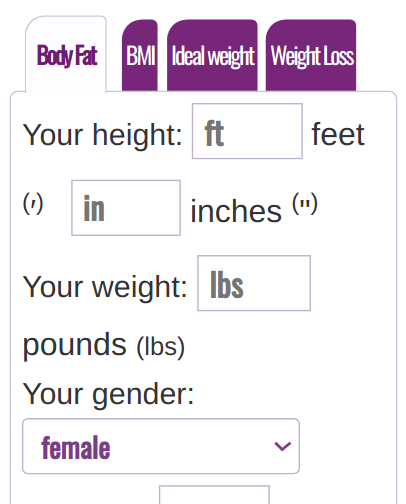15.8 body fat 60 years male 5 feet 8 inches 133 pounds
Body Fat Percentage Calculator - English System
Detailed info about your body fat percentage
Your relative position on the 60 years old man body fat scale:
There are many different methods for measuring body fat, but some are more accurate than others. This calculator computes appropriately your ideal bod fat percentage based reliable studies[1][2] on BMI for male or female ranging from 20 to 79 years.
Body fat types
Body fat consists of essential body fat and storage fat.
- Essential body fat is present in the nerve tissues, bone marrow, and organs. Essential fat is the minimum amount of fat necessary for basic physical and physiological health. It is approximately 3% of body mass for men and 12% of body mass for women.
- Storage fat, on the other hand, represents an energy reserve that accumulates when excess energy is ingested and decreases when more energy is expended than consumed.
In general, the total body fat percentage (essential plus storage fat) is between 12% and 15% for young men and between 25% and 28% for young women. Please keep in mind that these are only rough estimates.
Body fat chart for the general population (Categories Chart)
| Males | Females | Rating |
|---|---|---|
| 2–5% | 10–13% | Essential fat |
| 5-10% | 8-15% | Athletic |
| 11-14% | 16-23% | Good |
| 15-20% | 24-30% | Acceptable |
| 21-24% | 31-36% | Overfat |
| >24% | >37% | Obese |
Body fat percentage for the average population according to age and sex
Body fat percentage changes with age. Your body requires more body fat to remain healthy in older age. Here is a body fat percentage chart where you can see as body fat percentage changes with age.
Age-Adjusted Body Fat Chart for Men
| Age | Underfat | Healthy Range |
Overfat | Obese |
|---|---|---|---|---|
| 20-40 | Under 8% | 8-19% | 19-25% | Over 25% |
| 41-60 | Under 11% | 11-22% | 22-27% | Over 27% |
| 61-79 | Under 13% | 13-25% | 25-30% | Over 30% |
Women have a higher body fat percentage than men. For women, body fat helps when they become pregnant. Women also need a higher amount of body fat for ovulation. The following table tells about your fitness level considering the amount of fat you have.
Age-Adjusted Body Fat Chart for Women
| Age | Underfat | Healthy Range |
Overfat | Obese |
|---|---|---|---|---|
| 20-40 | Under 21% | 21-33% | 33-39% | Over 39% |
| 41-60 | Under 23% | 23-35% | 35-40% | Over 40% |
| 61-79 | Under 24% | 24-36% | 36%-42% | Over 42% |
How to compute/measure body fat percentage?
There are many methods to measure body fat. We can cite some of these below:
- Underwater weighing
- Whole-body air displacement plethysmography
- Near-infrared interactance
- Dual energy X-ray absorptiometry
- Body average density measurement
- Bioelectrical impedance analysis
- Anthropometric methods
The method presented here has the adavatages of its technical simplicity, its low cost and the fact that it is not time consuming. We have chosen the "Derived from BMI" method. It, normally, is used for the assessment of body fat percentage in epidemiological studies, but it fits well for a web based tool because it is not ease to measure body fat, unless you are a health professional. If the body fat is measeured by a no-preofessional, it is possible that the errors introduced in the measurement be greater than the intrinsic error of the BMI based method. Below are the formulas used on this calculator.
The relationship between densitometrically-determined body fat percentage (BF%) and BMI, taking age and sex (gender) (males = 1, females = 0) into account, can be computed by using the folowing formula:
BF% = 64.5 - 848/bmi + 0.079 × age - 16.4 × sex + 0.05 × sex × age + 39.0 × sex/bmi (Gallagher et. al.)[2]It is important to know that, as this calculator is based on BMI, it has the same limitations BMI has. That is, BMI measurements have no way of measuring where body fat is located in the body. It also can not distinguish between the weight of muscle or bones and the weight of fat. Someone who is very muscular may be classified as overweight, even if he/she is very fit. For example: a top class athlete, a sprinter or a rugby player, can be classified as overwight or even obese; someone in average BMI can carry a significantly higher amount of mass in his/her torso. So, besides measuring your body fat percentage (based on BMI), you should try other methods like waist measument, waist to hip ratio or the Arm body fat calculator. All these tools are independent and can give you more info about your heath.
If you want an updated and comprehensive guide on how to assess your body composition, we recommend this completely free guide.
Important note on BMI web tools
This calculator is not meant to serve as a source of clinical guidance. It does not provide medical advice. Body fat percentage is only an indicator of body fatness. Be carefull. Do not take any important decision about your health based on this or on any other web tool. Any questions about weight loss or changes to your diet should be discussed with your nutritionist or medical adviser for a more personalized estimation.
References:
- Deurenberg P, Weststrate JA, Seidell JC. (1991) Body mass index as a measure of body fatness: age- and sex-specific prediction formulas. Br J Nutr. 1991 Mar;65(2):105-14. (Retrieved August 31st 2016)
- Gallagher D, Heymsfield SB, Heo M, Jebb SA, Murgatroyd PR, Sakamoto Y. Healthy percentage body fat ranges: an approach for developing guidelines based on body mass index. (Retrieved August 31st 2016)
